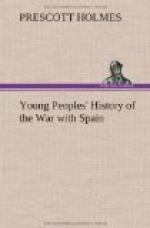It was an inspiring spectacle. General Miles, the Commander-in-Chief of the Army of the United States, rode at the head of the monster procession. Cheer after cheer arose from the enthusiastic crowds as the men who fought with Dewey swung past with rifles at “right shoulder.” They shouted themselves hoarse when a squad of “Rough Riders” trotted by; Hobson and his men received an ovation; Colonel Huntington marched at the head of the brave marines who made the bold stand at Guantanamo. It was a day of heroes, and all were welcomed and cheered royally.
[Illustration: (Troops on parade ground)]
CHAPTER XII.
The Philippine islands.
But in spite of Peace Jubilees and fine parades of returning troops, our country was still at war. But this war was with the natives of the Philippine Islands. To explain this trouble, I must go back in my story.
[Illustration: Aguinaldo.]
In another chapter I told you of the rebellion of the Filipinos against Spain. One of the leaders in the rebellion was a young man named Aguinaldo. The name means a “Christmas box.” Aguinaldo has been a good box for some people, a troublesome box for others. Well, to quiet that rebellion, Spain made many promises, and Aguinaldo and other leaders went to stay in China. Spain did not keep her promises, and the rebels took up arms again. Before Spain could quiet this trouble, Commodore Dewey destroyed the Spanish fleet in Manila Bay, and the Spanish soldiers fled to the city of Manila. Commodore Dewey had not forces enough to attack the city then, so he waited for more troops. But while he waited he blockaded the harbor. In June, General Merritt sailed from the United States with troops for Manila, and others were sent afterward.
On the way across the Pacific Ocean, at Guam, one of the Ladrone Islands, a ludicrous incident occurred. The Charleston steamed into the harbor, firing a few shots at the fort at its entrance. Several Spanish officers came out to the warship in a boat to apologize for not returning the salute, saying they had no powder. What was their astonishment upon being told they were prisoners, not even having heard that war had been declared.
The United States flag was raised over the island, and it is now held as a place to store large quantities of coal for the use of our war vessels.
Meanwhile, the Filipinos, and some of the savage tribes, had risen in great numbers against the Spaniards, and Aguinaldo returned and took command of his troops once more. Commodore Dewey, or Admiral Dewey, as he must now be called, having been promoted after his victory, tried to keep the natives in check; he did not think it right to let lawless people take the city of Manila.
The Spaniards made efforts to drive the Americans away from Manila, as well as to control the rebels, and sometimes matters seemed very serious for our men. On the 7th of August Admiral Dewey and General Merritt sent a notice to the Spanish General that, if he did not surrender by a certain day, they would attack Manila. They thought they could easily come to terms with the Filipinos, after settling the Spaniards.




